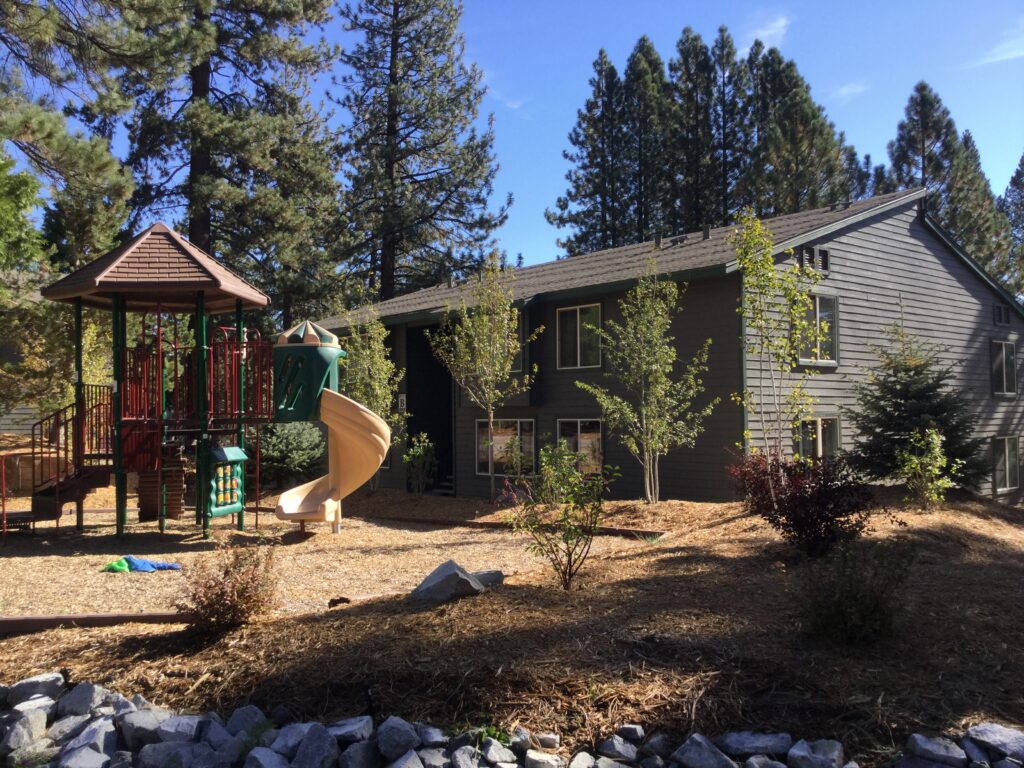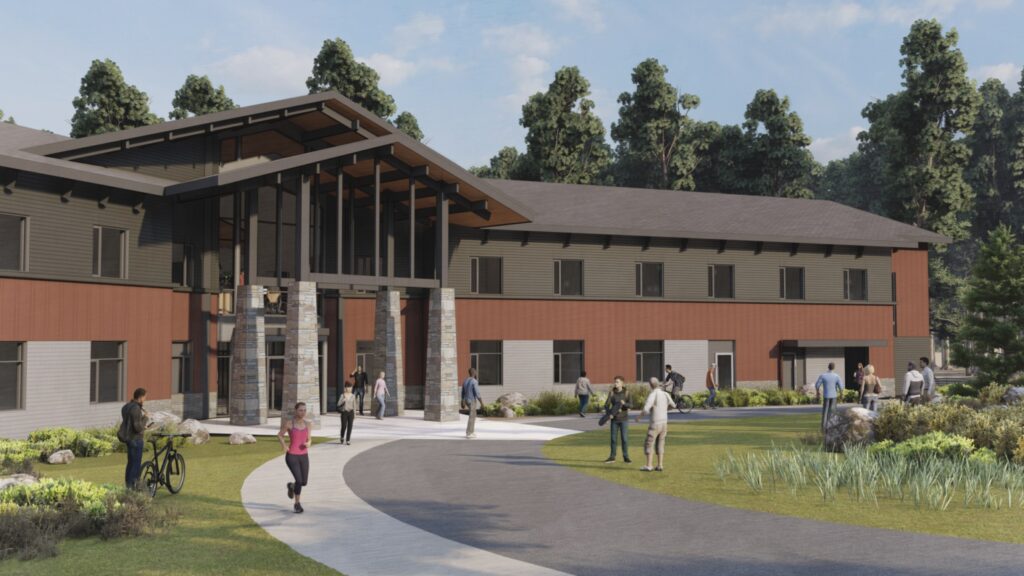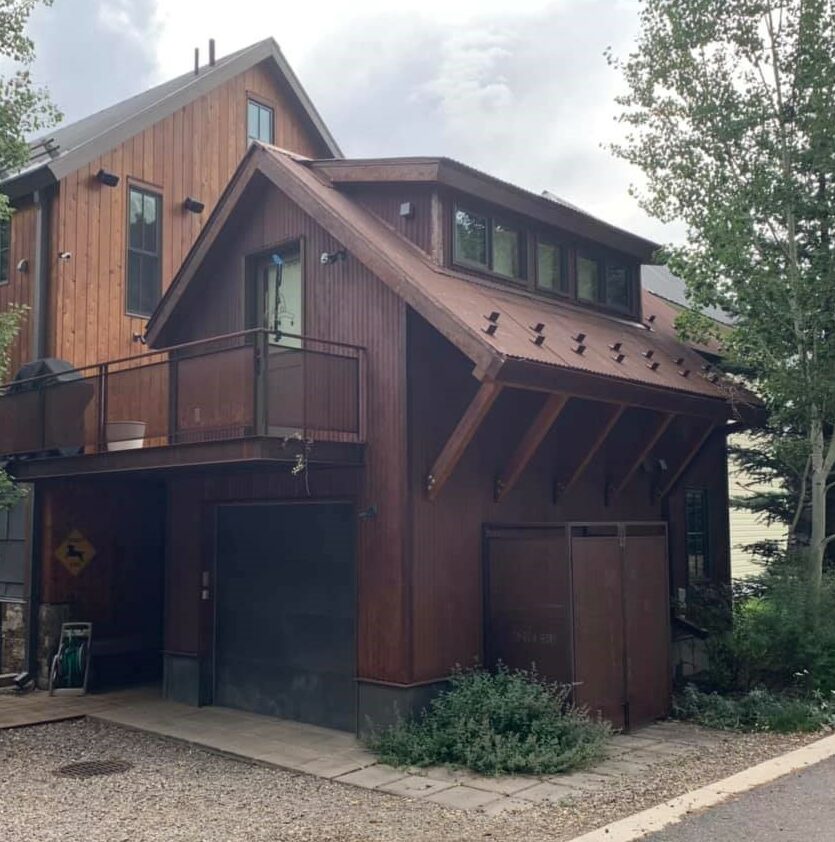Fulfilling Workforce Housing Needs in the Lake Tahoe Region
Having sufficient workforce housing in walkable communities is a key strategy in the Lake Tahoe Region to help reduce car travel and improve public safety by providing housing for critical workers such as emergency services, police, and fire, among others. By supporting and encouraging workforce housing solutions, the Tahoe Regional Planning Agency (TRPA) is implementing the Sustainable Communities Strategy and workforce housing goals of the Lake Tahoe Regional Plan.

One of several strategies TRPA continues to use is deed restricting affordable and workforce housing units. An income- or employment-based housing deed restriction is something a property owner records with the grant deed or title of their property with terms that specify things like sales and rental restrictions, limits on the income levels of households that live in the properties, or local employment requirements. Once the deed restriction is recorded with the appropriate assessor’s office, it becomes permanent and legally binding.
Deed restrictions can add new housing or preserve existing housing stock at several rates, including affordable, moderate, or achievable, each of which can help local residents and workers remain in the community. While housing studies have estimated how much additional workforce housing is needed in the Tahoe Basin, TRPA is also working to protect existing deed-restricted affordable housing units that have been secured in the past.
How Deed Restrictions Help
There are three main ways that TRPA has used deed restrictions over the years:
Subsidized housing
Issuing deed-restricted residential development rights to large projects allows local housing partners to successfully access state and federal grants and land donations for deed-restricted “affordable,” and “moderate” income housing. This kind of support has helped affordable housing developers, local jurisdictions, and the Saint Joseph Community Land Trust to complete subsidized housing projects of various sizes and types. It also helped Lake Tahoe Community College secure funding for a 100-bed on-campus living facility for low-income students that broke ground in August 2023.

Architectural rendering of the Lake Tahoe Community College student housing project.
Incentive-based housing
To build a home, condo, or multi-family unit in Tahoe, a residential development right (also known as a residential unit of use), is needed; however, to achieve and maintain environmental quality in the region, TRPA has capped growth and manages the limited amount of new development through an annual allocation process. Because these development rights are limited and sometimes costly, the agency created a Bonus Unit Incentive Pool that helps property owners who create deed-restricted affordable housing avoid delays, limitations, and additional costs of using standard development rights.
Developers or homeowners who build apartments or accessory dwelling units and who deed restrict the unit for use by local workers, or households in the “affordable” or “moderate” income categories can receive residential development rights from the Bonus Unit pool, plus additional incentives, such as fee waivers. New allowances such as additional building height, land coverage, and lower parking requirements are also under consideration for these deed-restricted units.
In 2018, following guidance from local housing advocates and a new working group, TRPA created an additional deed restriction category called “achievable” housing. This was intended to incentivize the construction of housing for the “missing middle” – those workers who make too much to qualify for subsidized housing and not enough to purchase a home.
Mitigation for the loss of existing affordable- and moderate-income housing
TRPA ordinances protect existing workforce housing by prohibiting subdivision of de facto affordable- and moderate-income housing units into condominiums unless the loss of those units is mitigated. De facto affordable housing are units that are affordable because of the way they have been historically managed or sold, such as mobile home parks and older apartment buildings. Since the 2000s, TRPA has required multiple project applicants to dedicate deed-restricted units as part of projects that replaced affordable housing with condominiums or other development.
There are approximately 250 of these early deed-restricted units in the Tahoe Basin, most of them in large rental apartment buildings.
Compliance with Deed Restrictions
TRPA monitors, tracks, and enforces compliance with deed restrictions in several ways:
- Beginning in 2018, TRPA established a requirement for new deed-restricted units to submit an annual compliance form, which is submitted electronically. There are financial penalties for failure to submit the form, and higher penalties for failure to comply with the requirements of the deed restrictions. Instructions on how to access and complete the online Deed-Restriction Compliance Form can be found here.
- To date, three properties have met the criteria for compliance reporting and were required to submit online compliance forms by April 15, 2023. All three properties submitted the forms showing they are in compliance.
- To ensure other properties are in compliance, TRPA is bringing approximately 250 deed-restricted properties in the basin into the annual compliance program as well. These properties were deed-restricted under earlier initiatives to protect workforce housing. During the compliance process, the agency is issuing letters ensuring that owners understand the terms of their deed restriction and requiring documentation of compliance.
- A specialized third-party contractor is working with properties that are non-responsive or that are out of compliance with the terms of their deed-restriction.
-
- TRPA is focusing initial compliance efforts on 95 units in multiple locations in Incline Village, Nev. Approximately 75 percent of these units were found to be in compliance with the sales price requirements of their deed restriction.
- The agency has issued letters to owners/managers of all 95 units ensuring the terms of their deed restriction is understood. TRPA has issued follow-up letters requesting documentation to 71 of the units.
- More information on this audit and public information is in Understanding Deed-Restricted Properties below.
-
- For violations of TRPA’s Code of Ordinances, including deed restriction violations, enforcement actions can include penalties of up to $5,000 per day. Actions carried out by the TRPA code enforcement team generally result in compliance. In other cases, the agency can file a civil complaint seeking penalties and an injunction. The agency’s primary goal would be to reinstate deed-restricted affordable housing and cover enforcement costs, however a financial judgement or settlement could result.

Understanding Deed-Restricted Properties
Information about individual properties may be found on TRPA’s Lake Tahoe Info Parcel Tracker. The parcel summary will show if a deed restriction is on record for a property. If one is recorded, the parcel tracker lists a summary of the terms of the deed restriction, as well as a copy of the deed restriction itself. It also shows a record of communication with the homeowner, if any, and enforcement cases.
While information on individual parcels is openly available on Lake Tahoe Info, TRPA policies do not allow the release of lists or personal addresses of property owners who participate in TRPA programs such as deed-restrictions. In September 2023, TRPA entered into a contract with a third-party consultant, HousingInc., to conduct the annual compliance and monitoring of deed-restrictions for 2023 and 2024, and to produce an annual report on the compliance status of all deed-restricted units which will be available to the Governing Board and the public. The consultant has also been asked to make recommendations for improvements to the process as a whole.
In March 2024, TRPA staff completed a Deed-Restriction Status Report that addresses the on-going improvement efforts to the deed-restriction program. This report demonstrates the previous actions taken to bring deed-restricted properties into compliance, current compliance monitoring and audit efforts, and recommendations of new tools to integrate into deed-restriction compliance processes.
